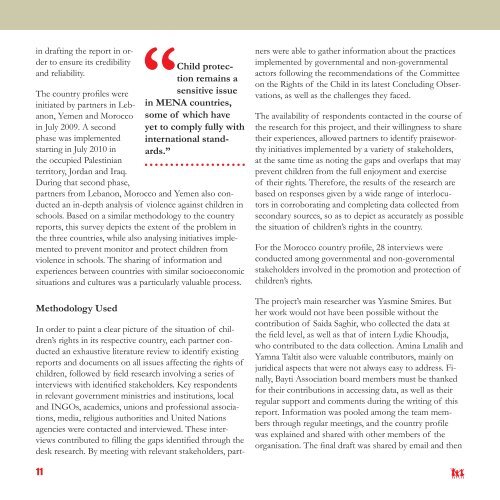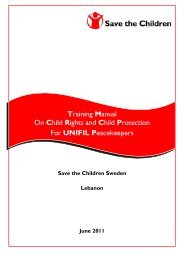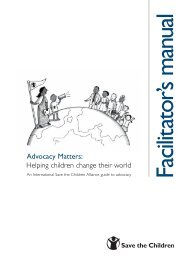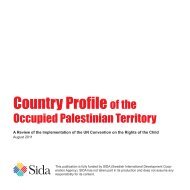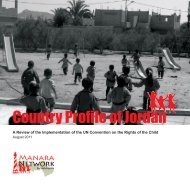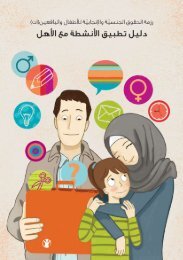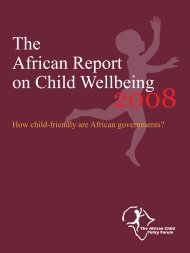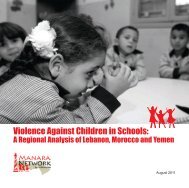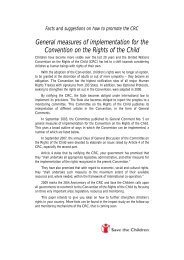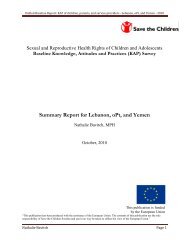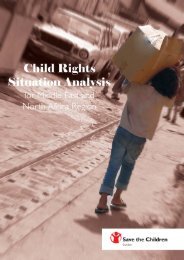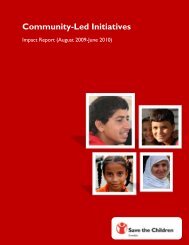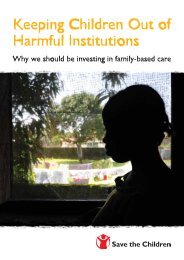Country Profile of Morocco - International Bureau of Children's Rights
Country Profile of Morocco - International Bureau of Children's Rights
Country Profile of Morocco - International Bureau of Children's Rights
You also want an ePaper? Increase the reach of your titles
YUMPU automatically turns print PDFs into web optimized ePapers that Google loves.
in drafting the report in order<br />
to ensure its credibility<br />
and reliability.<br />
The country pr<strong>of</strong>iles were<br />
initiated by partners in Lebanon,<br />
Yemen and <strong>Morocco</strong><br />
in July 2009. A second<br />
phase was implemented<br />
starting in July 2010 in<br />
the occupied Palestinian<br />
territory, Jordan and Iraq.<br />
During that second phase,<br />
11<br />
“Child protection<br />
remains a<br />
sensitive issue<br />
in MENA countries,<br />
some <strong>of</strong> which have<br />
yet to comply fully with<br />
international standards.”<br />
partners from Lebanon, <strong>Morocco</strong> and Yemen also conducted<br />
an in-depth analysis <strong>of</strong> violence against children in<br />
schools. Based on a similar methodology to the country<br />
reports, this survey depicts the extent <strong>of</strong> the problem in<br />
the three countries, while also analysing initiatives implemented<br />
to prevent monitor and protect children from<br />
violence in schools. The sharing <strong>of</strong> information and<br />
experiences between countries with similar socioeconomic<br />
situations and cultures was a particularly valuable process.<br />
Methodology Used<br />
In order to paint a clear picture <strong>of</strong> the situation <strong>of</strong> children’s<br />
rights in its respective country, each partner conducted<br />
an exhaustive literature review to identify existing<br />
reports and documents on all issues affecting the rights <strong>of</strong><br />
children, followed by field research involving a series <strong>of</strong><br />
interviews with identified stakeholders. Key respondents<br />
in relevant government ministries and institutions, local<br />
and INGOs, academics, unions and pr<strong>of</strong>essional associations,<br />
media, religious authorities and United Nations<br />
agencies were contacted and interviewed. These interviews<br />
contributed to filling the gaps identified through the<br />
desk research. By meeting with relevant stakeholders, part-<br />
ners were able to gather information about the practices<br />
implemented by governmental and non-governmental<br />
actors following the recommendations <strong>of</strong> the Committee<br />
on the <strong>Rights</strong> <strong>of</strong> the Child in its latest Concluding Observations,<br />
as well as the challenges they faced.<br />
The availability <strong>of</strong> respondents contacted in the course <strong>of</strong><br />
the research for this project, and their willingness to share<br />
their experiences, allowed partners to identify praiseworthy<br />
initiatives implemented by a variety <strong>of</strong> stakeholders,<br />
at the same time as noting the gaps and overlaps that may<br />
prevent children from the full enjoyment and exercise<br />
<strong>of</strong> their rights. Therefore, the results <strong>of</strong> the research are<br />
based on responses given by a wide range <strong>of</strong> interlocutors<br />
in corroborating and completing data collected from<br />
secondary sources, so as to depict as accurately as possible<br />
the situation <strong>of</strong> children’s rights in the country.<br />
For the <strong>Morocco</strong> country pr<strong>of</strong>ile, 28 interviews were<br />
conducted among governmental and non-governmental<br />
stakeholders involved in the promotion and protection <strong>of</strong><br />
children’s rights.<br />
The project’s main researcher was Yasmine Smires. But<br />
her work would not have been possible without the<br />
contribution <strong>of</strong> Saida Saghir, who collected the data at<br />
the field level, as well as that <strong>of</strong> intern Lydie Khoudja,<br />
who contributed to the data collection. Amina Lmalih and<br />
Yamna Taltit also were valuable contributors, mainly on<br />
juridical aspects that were not always easy to address. Finally,<br />
Bayti Association board members must be thanked<br />
for their contributions in accessing data, as well as their<br />
regular support and comments during the writing <strong>of</strong> this<br />
report. Information was pooled among the team members<br />
through regular meetings, and the country pr<strong>of</strong>ile<br />
was explained and shared with other members <strong>of</strong> the<br />
organisation. The final draft was shared by email and then


